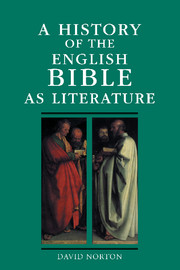Book contents
- Frontmatter
- Contents
- List of plates
- Preface
- List of abbreviations
- 1 Creators of English
- 2 From the Great Bible to the Rheims-Douai Bible: arguments about language
- 3 The King James Bible
- 4 Literary implications of Bible presentation
- 5 The struggle for acceptance
- 6 The Psalter in verse and poetry
- 7 ‘The eloquentest books in the world’
- 8 Writers and the Bible 1: Milton and Bunyan
- 9 The early eighteenth century and the King James Bible
- 10 Mid-century
- 11 The critical rise of the King James Bible
- 12 Writers and the Bible 2: the Romantics
- 13 Literary discussion to mid-Victorian times
- 14 The Revised Version
- 15 ‘The Bible as literature’
- 16 The later reputation of the King James Bible
- 17 The New English Bible
- Bibliography
- General Index
- Biblical Index
16 - The later reputation of the King James Bible
Published online by Cambridge University Press: 05 June 2012
- Frontmatter
- Contents
- List of plates
- Preface
- List of abbreviations
- 1 Creators of English
- 2 From the Great Bible to the Rheims-Douai Bible: arguments about language
- 3 The King James Bible
- 4 Literary implications of Bible presentation
- 5 The struggle for acceptance
- 6 The Psalter in verse and poetry
- 7 ‘The eloquentest books in the world’
- 8 Writers and the Bible 1: Milton and Bunyan
- 9 The early eighteenth century and the King James Bible
- 10 Mid-century
- 11 The critical rise of the King James Bible
- 12 Writers and the Bible 2: the Romantics
- 13 Literary discussion to mid-Victorian times
- 14 The Revised Version
- 15 ‘The Bible as literature’
- 16 The later reputation of the King James Bible
- 17 The New English Bible
- Bibliography
- General Index
- Biblical Index
Summary
TESTIMONIES FROM WRITERS
In considering the reputation of the KJB over the century since the RV, it may be best to start with a somewhat amorphous collection of testimonies from writers to their experience of the KJB and, sometimes, its influence on their work, The History of the English Bible (1894) by the American Baptist minister and professor, author of The Religious Influence of Wordsworth, T. Harwood Pattison (1838–1904). It begins ordinarily enough but goes on to chapters on ‘the Bible in English literature’, and ‘the Bible and the nation’. An observation Pattison attributes to the American Prebysterian minister Charles Henry Parkhurst sums up the motivation for this development: ‘“I am interested in the people who made the Bible, but I am more interested in the people whom the Bible makes, for they show me the fibre and genius of Scripture as no mental studiousness or verbal exegesis can do”’ (p. 222). So in these chapters Pattison moves beyond opinions of the literary excellence of the Bible to testimonies from writers that their work was shaped by the Bible. His aim is to show that, ‘from John Bunyan to John Ruskin … we owe more than we can ever tell to our early training in the English of the Bible. The character of our national tongue has been tempered by it; and to it our great writers are largely indebted for the sobriety, the strength and the sweetness which distinguish their best efforts’ (p. 185). He by no means confines himself to style, but the question of where a writer gets his style recurs.
- Type
- Chapter
- Information
- A History of the English Bible as Literature , pp. 387 - 429Publisher: Cambridge University PressPrint publication year: 2000



